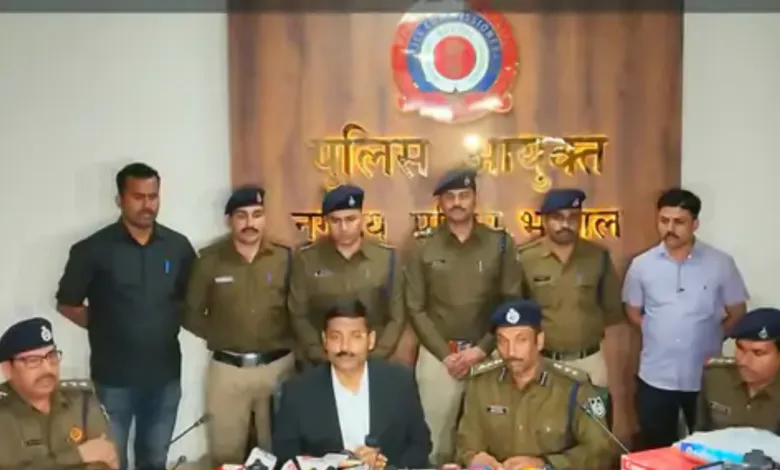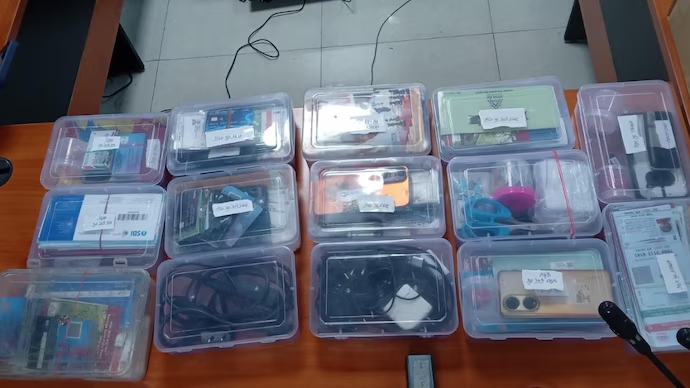
In a significant crackdown on financial fraud, Bhopal Police has exposed and dismantled a large network involved in creating and selling fake bank accounts using forged documents. The operation led to the arrest of seven individuals from Bihar, marking a major victory against interstate cyber fraud.
Extensive Fraud Network Uncovered
The arrested gang operated across multiple cities, including Bhopal, Indore, Lucknow, Mumbai, and Ahmedabad. They established their base by renting a house in Bhopal and setting up a call center in a room located in Ibrahimpura. This strategic setup enabled them to efficiently produce and distribute fake documents essential for creating fraudulent bank accounts. During interrogation, the accused admitted to manufacturing fake Aadhaar and PAN cards while operating from six different cities across the country.
Modus Operandi: Creating and Selling Fake Bank Accounts
The gang meticulously crafted fake bank accounts, selling approximately 1,800 accounts for ₹10,000 each. These accounts were created using forged Aadhaar and PAN cards, allowing cyber fraudsters to conduct illicit transactions. Police investigations revealed that these fake accounts were used to facilitate transactions worth crores of rupees, highlighting the extensive scale of the fraud.

Financial Transactions and Cyber Fraud Implications
Police Commissioner Harinarayan Chari Mishra emphasized the gravity of the situation, stating, “The accused used to sell a fake account for about ₹10,000. Cyber fraudsters exploited these fake accounts to carry out fraudulent activities. We have uncovered evidence of transactions worth crores of rupees in these accounts.” The use of such accounts not only defrauds innocent individuals but also undermines the integrity of the banking system.
Suspicion on Bank and Postal Employees
DCP Riyaz Iqbal raised concerns about the potential involvement of bank and postal employees in facilitating the fraud. “Due to the ease of opening a large number of fake bank accounts, the role of bank employees, postal employees, and employees of various departments appears suspicious. We are actively investigating the possibility of their involvement in this fraud,” he stated. This angle is being thoroughly examined as the police seek to uncover any internal collusion that may have aided the gang’s operations.
Profile of the Accused
All seven accused have educational backgrounds ranging from the fourth to the 12th grade. The main accused, Shashikant Kumar alias Manish, aged 26, is identified as the gang leader. Residing in Nalanda, Bihar, he was responsible for preparing Aadhaar and PAN cards and selling them further. Other key members include:
- Sapna alias Sadhna (21) – From Patna, Bihar, Sapna used fake documents to open bank accounts by obtaining SIM cards.
- Ankit Kumar Sahu alias Sunil (20) – Hailing from Jehanabad, Bihar, Ankit engaged in opening accounts using forged Aadhaar and PAN cards after completing his 12th standard.
- Kaushal Mali alias Pankaj (19) – From Jehanabad, Bihar, Kaushal opened bank accounts using fake documents after passing the 10th standard.
- Roshan Kumar (20) – Resident of Patna, Bihar, Roshan created fake accounts using forged documents after completing the 10th standard.
- Ranjan Kumar alias Vinod (19) – From Patna, Bihar, Ranjan opened bank accounts using fake documents after completing the 5th standard.
- Mohammad Titu alias Vijay (18) – The youngest accused from Patna, Bihar, Mohammad completed up to the fourth grade and was involved in opening bank accounts with fake documents.
Rapid Movement and Short Stays
Police investigations revealed that the accused did not stay in any single city for more than two months, facilitating their ability to operate across different regions without raising immediate suspicion. Their transient lifestyle made it easier to evade detection while expanding their fraudulent activities.
Raid and Seizure
Acting on a tip-off from an informer, Hanumanganj police conducted a raid on the gang’s hideout, successfully dismantling the network. During the raid, police seized a significant number of fake documents and evidence of financial transactions, further solidifying the case against the accused.
Detailed Investigation Findings
During interrogation, the accused admitted to editing and forging documents to create fake Aadhaar and PAN cards. These documents were then used to open bank accounts and purchase SIM cards, facilitating cyber fraud against unsuspecting victims. The police found that these fake accounts were instrumental in executing large-scale fraudulent transactions, compromising the financial security of numerous individuals.
Implications for Financial Institutions
The case highlights serious vulnerabilities within the banking and postal systems, where the ease of opening fake accounts points to potential lapses in verification processes. The involvement of bank and postal employees is under scrutiny, as authorities aim to identify any internal collusion that may have supported the fraud.
Ongoing Investigations and Future Actions
Bhopal Police continues to investigate the involvement of additional individuals and institutions that may have facilitated the gang’s operations. Efforts are underway to trace the flow of funds and identify the cyber fraudsters who exploited the fake accounts for illicit activities. The police are also working to enhance verification protocols to prevent similar frauds in the future.
Conclusion
The dismantling of this interstate gang marks a significant achievement for Bhopal Police in combating financial fraud. By arresting the seven accused and uncovering the extensive network involved in creating and selling fake bank accounts, authorities have taken a crucial step towards safeguarding the integrity of the banking system. The ongoing investigations aim to bring all responsible parties to justice and implement stronger measures to prevent such large-scale frauds in the future.
